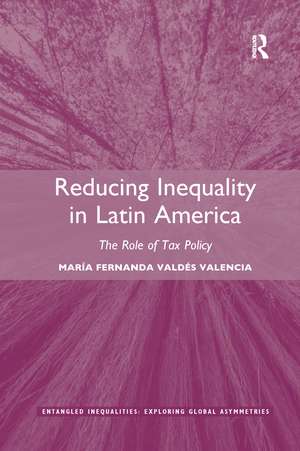Reducing Inequality in Latin America: The Role of Tax Policy: Entangled Inequalities: Exploring Global Asymmetries
Autor María Fernanda Valdés Valenciaen Limba Engleză Paperback – 30 iun 2020
| Toate formatele și edițiile | Preț | Express |
|---|---|---|
| Paperback (1) | 259.98 lei 43-57 zile | |
| Taylor & Francis – 30 iun 2020 | 259.98 lei 43-57 zile | |
| Hardback (1) | 846.50 lei 43-57 zile | |
| Taylor & Francis – 12 sep 2016 | 846.50 lei 43-57 zile |
Preț: 259.98 lei
Preț vechi: 311.41 lei
-17% Nou
Puncte Express: 390
Preț estimativ în valută:
49.75€ • 52.07$ • 41.41£
49.75€ • 52.07$ • 41.41£
Carte tipărită la comandă
Livrare economică 31 martie-14 aprilie
Preluare comenzi: 021 569.72.76
Specificații
ISBN-13: 9780367596101
ISBN-10: 0367596105
Pagini: 170
Dimensiuni: 156 x 234 mm
Greutate: 0.45 kg
Ediția:1
Editura: Taylor & Francis
Colecția Routledge
Seria Entangled Inequalities: Exploring Global Asymmetries
Locul publicării:Oxford, United Kingdom
ISBN-10: 0367596105
Pagini: 170
Dimensiuni: 156 x 234 mm
Greutate: 0.45 kg
Ediția:1
Editura: Taylor & Francis
Colecția Routledge
Seria Entangled Inequalities: Exploring Global Asymmetries
Locul publicării:Oxford, United Kingdom
Cuprins
List of Figures
List of Tables
List of Annexes
Part I: Taxation and the inequality decline in Latin America
1. Introduction. Taxation and the inequality decline in Latin America
Part II: The Taxation and Inequality Link
2. The empirics of taxation and inequality
3. Public finance, taxation and inequality
4. Macroeconomics, taxation and inequality
5. Political economy, taxation and inequality
Part III: A methodological approach to measuring pro-equity tax policy
6. Measuring tax policy over time
7. My approach: a structural tax revenue analysis
8. A quantitative investigation of taxation in five Latin American countries
9. The narrative approach towards five Latin American countries
Part V: Tax policy before, during and beyond the Latin American inequality
10. Conclusion
References
Annexes
List of Tables
List of Annexes
Part I: Taxation and the inequality decline in Latin America
1. Introduction. Taxation and the inequality decline in Latin America
Part II: The Taxation and Inequality Link
2. The empirics of taxation and inequality
3. Public finance, taxation and inequality
4. Macroeconomics, taxation and inequality
5. Political economy, taxation and inequality
Part III: A methodological approach to measuring pro-equity tax policy
6. Measuring tax policy over time
7. My approach: a structural tax revenue analysis
8. A quantitative investigation of taxation in five Latin American countries
9. The narrative approach towards five Latin American countries
Part V: Tax policy before, during and beyond the Latin American inequality
10. Conclusion
References
Annexes
Notă biografică
Maria Fernanda Valdés Valencia is an independent researcher and program coordinator for the Friedrich Ebert Stiftung in Bogotá.
Recenzii
'This book addresses a key topic for Latin America. Despite progress, inequality remains very high and tax policy could play a more prominent role in improving the income distribution. Those interested in the technical and political dimensions of this debate, will find herein a comprehensive and passionate view of how taxation can become a more effective development tool in the region.' - Christian Daude, Senior Economist - Adviser to the Chief Economist, Organisation for Economic Co-operation and Development, France
'This book addresses in a clear and innovative way critical questions that have concerned for a long time those interested in Latin American inequality: what role has tax policy played to mitigate inequality, and how can we enhance that role going forward. Maria Fernanda Valdés has created an important resource for policy analysts, professors and researchers, civil society and students alike. For those interested in this topic, this is a must read.' - José Antonio Ocampo, Professor, Columbia University, U.S.A
'This book addresses two key questions: if tax policy contributed to the recent decline in inequality observed in several countries in Latin America and if equity considerations have played a role in the design of tax policies in the region. Its negative answer to both questions is a call of attention to policy makers that are now facing the need to enact tax reforms to partially compensate for the reduction of commodity-driven fiscal revenues. The book is also a rich source of information on theories about potential impacts of taxation on inequality and empirical studies relating taxation to inequality in the region and elsewhere.' - Guillermo Perry, Universidad de Los Andes, Colombia and Center for Global Development, U.S.A
'This book addresses in a clear and innovative way critical questions that have concerned for a long time those interested in Latin American inequality: what role has tax policy played to mitigate inequality, and how can we enhance that role going forward. Maria Fernanda Valdés has created an important resource for policy analysts, professors and researchers, civil society and students alike. For those interested in this topic, this is a must read.' - José Antonio Ocampo, Professor, Columbia University, U.S.A
'This book addresses two key questions: if tax policy contributed to the recent decline in inequality observed in several countries in Latin America and if equity considerations have played a role in the design of tax policies in the region. Its negative answer to both questions is a call of attention to policy makers that are now facing the need to enact tax reforms to partially compensate for the reduction of commodity-driven fiscal revenues. The book is also a rich source of information on theories about potential impacts of taxation on inequality and empirical studies relating taxation to inequality in the region and elsewhere.' - Guillermo Perry, Universidad de Los Andes, Colombia and Center for Global Development, U.S.A
Descriere
This book examines the role of tax policy in the incidence of socio-economic inequality. With a focus on Latin America, the author demonstrates that while inequality has decreased remarkably in the last decade - during the very period in which inequality was increasing almost everywhere else in the world - this reduction cannot be attributed to a b








